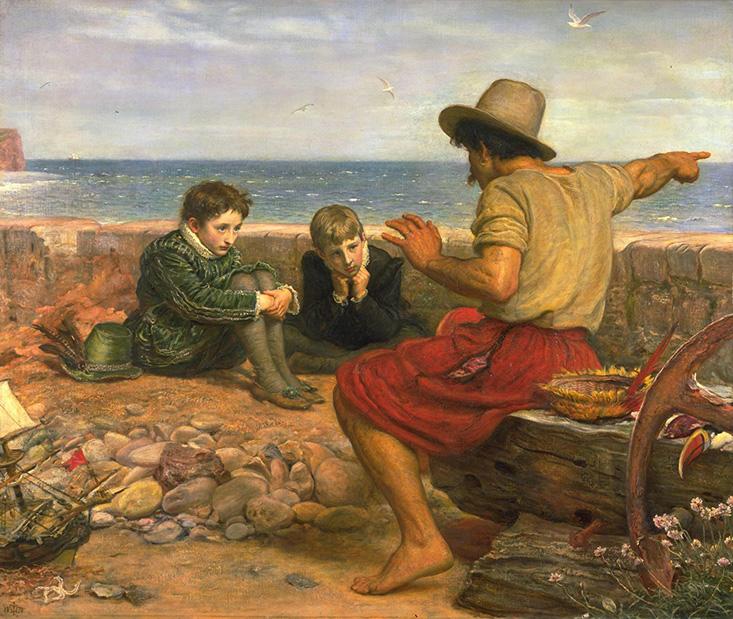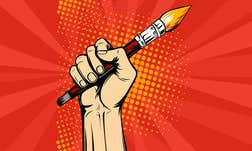We’re all stories in the end.
— “The Big Bang,” Doctor Who“>
In 2003, author James Frey published a bestselling autobiographical memoir, A Million Little Pieces, purportedly detailing his struggle to overcome addiction. Nearly three years later, during a riveting appearance on Oprah, he admitted that several supposedly factual details had been embellished or fabricated. All later editions of the book included a note from Frey, admitting his embellishments but claiming that his primary mistake had been “writing about the person I created in my mind to help me cope, and not the person who went through the experience.”
It was an interesting choice of words, given the role story plays in personal identity. Deep down, we are all raconteurs, drawing on past memories and weaving them into a coherent narrative to construct our autobiographical selves. “The story metaphor fits lives,” says Dan McAdams, a psychologist at Northwestern University who specializes in the autobiographical self. “It has a beginning, middle, and end. It has characters with times and scenes. That is how life is, and that is how people see life.”

McAdams has identified three distinct layers to his model for the autobiographical self. By the age of two, most of us can recognize ourselves in mirrors and understand how we fit in with relation to others. At this point, we are actors in our personal narratives, defining ourselves by explicit traits and the roles we play. We might be shy and conscientious students, while others are funny, outgoing, and popular.
Around the age of 8, we add another layer: the self as agent. Now, in addition to being actors in our own lives, we also perceive our own agency: We can look at our past, project into the future, and set goals, whether we want to become an astronaut, a writer, or merely find a best friend. Finally, as we move into early adulthood, we embrace the self as author, developing a narrative identity that we continue to hone for the rest of our lives to describe what kind of actors we are, and why, as agents, we do what we do.
Bush evinces a classic redemptive narrative, achieving sobriety and literally redeeming himself by becoming an evangelical Christian. This gave him motivation to impose his own narrative on the rest of the country.
His conclusions are based on hundreds of personal life story interviews, conducted over many years, with adults from all walks of life. The entire process lasts two hours. The interviews are recorded and transcribed, and McAdams works from the written transcripts. The subjects are asked to imagine their lives as a book, with chapters, just like a novel.
Then McAdams asks them to focus on key scenes: a high point, a low point, a turning point, a negative early memory, a positive early memory, and so on—all universal elements to a good narrative. The broad strokes are the same: We all experience many such moments over the course of our lives, and we weave them into our story as it evolves.
Next, McAdams asks the subject to identify those people who have filled the roles of heroes and villains. Subjects are also asked to think about future chapters—goals and aspirations—and how their values and beliefs are reflected in the full arc of the personal narrative.
Finally McAdams asks subjects to identify overarching themes running through their stories. One common theme is redemption, particularly among people he calls “highly generative”—those who volunteer in soup kitchens or political campaigns, start their own non-profit charity, or otherwise seek to make a positive impact on the world. Their stories invariably involve hardship and suffering, but with an optimistic twist: They triumphed over their woes, learned valuable life lessons from the pain, and emerged stronger for it.
This doesn’t mean that non-highly generative people are necessarily worse storytellers; their stories just don’t have highly redemptive themes. It requires a lot of hard work to be a generative person—how much easier would be to just stay home and watch American Idol?—and McAdams thinks that having a strong redemptive narrative serves as a motivational tool.
That certainly seems to be the case for former U.S. President George W. Bush. In 2011, McAdams published the first comprehensive psychological profile of the former president in George W. Bush and the Redemptive Dream—a tricky task, particularly for such a politically polarizing figure. Bush evinces a classic redemptive narrative, achieving sobriety and literally redeeming himself by becoming an evangelical Christian, according to McAdams, who argues that this gave him a powerful motivation for trying to impose his own narrative on the rest of the country. (McAdams gave an lecture on the Bush profile that is on YouTube.) Frey, too, adopted a redemptive theme in A Million Little Pieces.
In the end, of course, all stories are ultimately about change. Nobody tells a story about how they’ve always been the same. Therein lies the psychological power of narrative. We can change our stories, thereby changing ourselves, even though our core self remains the same.
This article originally appeared on our blog, Facts So Romantic, in May 2013.


























